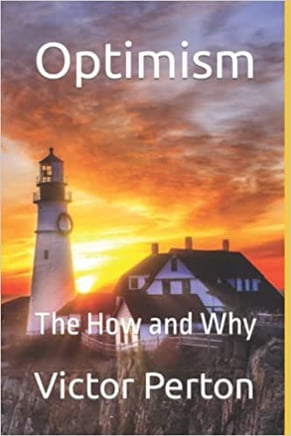Optimism Can be Learned
The good news? Optimism can be learned, developed and increased at any age!
By Victor Perton, the Author of "Optimism: The How and Why"
The good news? Optimism can be learned, developed and increased at any age!
A leading researcher on longevity and optimism, Professor Lewina Lee, said: "We know that optimism is about 25% heritable, which means that there is room to modify it."
What's interesting about that suggestion from Lewina is in our surveys, only 18% of people call themselves natural optimists.
Meghan Moravcik Walbert put it well for parents: "A person may be naturally inclined to be either pessimistic or optimistic, but there are things parents can do to encourage and strengthen the optimism muscles in their kids (and themselves)."
The science of neuroplasticity shows that our brains constantly make new connections. We strengthen positive neural networks by looking for the positives in life and deliberately cultivating optimistic thoughts and words.
Exercises that increase and maintain optimism include:
- Surround yourself with Optimists;
- Using The Language of Optimism;
- Smile and Say Hello to Everyone;
- Greet People Optimistically;
- Asking "What makes you optimistic?";
- Ask Others, "What makes you optimistic?";
- Positive Self-Talk;
- Turn Down The "News";
- Read Some Optimism Every Day;
- Write Positive Affirmations;
- Laugh More;
- Imagine Your Best Possible Self;
- Practise Gratitude through Daily Gratitude Reflections;
- Meditation;
- Yoga and Exercise;
- Listen to The Music of Optimism;
- What's your Optimism Superpower?
As Sean O'Sullivan said to me, "It makes me optimistic to see optimism being specifically focused upon as an influenceable attribute!"
Project Optimism, a partnership between The Centre for Optimism and Educate to Elevate, has produced an animated course with 14 habits of an optimist. Try the "Habits of an Optimist" and give the course a go! It takes an hour or a lifetime to complete, and there's a micro-credential at the end.
Craig Dempsey, Co-Founder & Managing Director, Biz Latin Hub
“Some people will lead and others will follow, but like in life, optimism and leadership is not something that you are born with or receive, it's, in fact, something you create, foster and grow from within”
"Optimism is not about having rose-colored glasses. It isn’t about refusing to see reality. Nor is optimism something one just wills into existence. It must be learned and practiced again and again. It is not about changing others’ decisions but changing our own. And that includes our decision to manage our reactions to events that are outside of our control. Optimism is about much more than “being happy.” It’s about recognizing that we have choices and deriving a sense of hopefulness from the power to make decisions for ourselves. Put simply. Hope is a choice."
Read more on the habits of optimism and inspiring quotable quotes in "Optimism: The How and Why" by Victor Perton, CEO of The Centre for Optimism.
 Project Optimism has produced "The Optimist's Gratitude Journal: 100 days to share and develop your gratitude" which is very helpful.
Project Optimism has produced "The Optimist's Gratitude Journal: 100 days to share and develop your gratitude" which is very helpful.
See https://www.amazon.com/Optimists-Gratitude-Journal-develop-gratitude/dp/B09MC5ZNPX



.svg)